Edie Melson's Blog, page 155
August 4, 2021
Do You Participate in Writing Sprints?

by Lynn H. Blackburn @LynnHBlackburn
I love the Olympics.
I like sports. I watch football and baseball and basketball all the time. But during the Olympics, I find myself watching all kinds of random sports that I know nothing about.
During the Winter Olympics it’s curling. This year’s Summer Olympics had me watching women’s rugby and I still have questions about that one. Are there rules? Because it seems like they just throw the ball and jump on each other? (Seriously, if you’re a rugby expert, explain this to me!)
Anyway.
One of the things I love most about the Olympics is the way the athletes have control of their bodies. They flip, they twist, they jump, they take unbelievable risks on bikes and balance beams, they run, and they swim. Some athletes have unbelievable endurance. Some athletes are unbelievably fast.
Of course, this made me think about writing. Because if you’re going to make a career out of writing, you’re going to need to take control of your writing time and at different times be both a sprinter and an endurance writer.
Endurance is necessary to finish a manuscript. You’ll face days, maybe even weeks, where you need to write thousands of words a day in order to meet your deadlines. But when you finally type the end, you’re still nowhere near done. There’s revising, editing, marketing, and publicity, and if you happen to have a multi-book contract or you’re planning to indie publish a book every six, nine, or twelve months, you’ll be doing that post-writing work on the book you’ve finished while you’re writing the next book.
I’ve been an endurance writer for a while now, but I’ve recently rediscovered how effective - and fun - it can be to sprint, even though as a rule, I’m not wired for sprinting. I prefer a slower pace, both physically and mentally.
But writing sprints are a fabulous way to get my words in when time is short, and even more importantly, when I’m distracted because all I want to do is watch the Olympics! You can play with the timing to see what works best for you, but fifteen minutes works great for me.
Here are my favorite writing sprints:
Alone. Okay, this one isn’t actually my favorite, but it is effective. Even when I’m tired and distracted, I can usually convince myself to work for fifteen minutes. And once I get that first fifteen minutes done, I’m usually revved up and ready to go for another few rounds.
Advantages: I just need my computer. It’s unnecessary to coordinate with anyone else. I can do this at any time of day or night.
In person. I’m fortunate to have many writing friends who live nearby. We can meet in our homes, local coffee shops, etc. and work for a few hours. We do have to be careful to work and not talk the whole time, but this is where sprinting helps. We have to shut up and focus!
Advantages: It’s always encouraging to spend time with fellow writers. And a little friendly competition is a good thing!
Via text. Yes, this works. In fact, it works so well that this is the method I use most often. Text your writing buddies to get ready, set a fifteen minute timer, text “go” and then write as fast as you can. When the timer goes off, text “stop” and calculate your word count. Then do it again. And again. This method has netted me around 3K in word count over the past few days.
Advantages: You can do this anywhere. Anytime. You don’t have to put on real clothes or brush your hair or anything. :)
Zoom. This method allows you to sprint with writers all over the world and it’s also a great option if it’s difficult for you to get out of the house to meet up with others. When we do this, we mute our computers during the fifteen minutes we’re sprinting, but we keep the video on to maintain the sense of community. Then we unmute when we’re tallying our word count.
Advantages: Keeps you connected to your far-flung writer friends. And it’s fun!
There are probably more methods, but these are the ones I use. If you have another method, please share it with us. And if you haven’t tried sprinting, give it a shot and let us know how it goes!
Grace and peace,

TWEETABLEDo You Participate in Writing Sprints? @LynnHBlackburn on @EdieMelson (Click to Tweet)
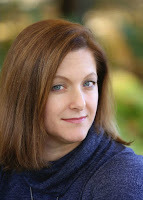 Lynn H. Blackburn loves writing romantic suspense because her childhood fantasy was to become a spy, but her grown-up reality is that she's a huge chicken and would have been caught on her first mission. She prefers to live vicariously through her characters and loves putting them into all kinds of terrifying situations while she's sitting at home safe and sound in her pajamas!
Lynn H. Blackburn loves writing romantic suspense because her childhood fantasy was to become a spy, but her grown-up reality is that she's a huge chicken and would have been caught on her first mission. She prefers to live vicariously through her characters and loves putting them into all kinds of terrifying situations while she's sitting at home safe and sound in her pajamas! Lynn’s titles have won the Carol Award, the Selah Award, and the Faith, Hope, and Love Reader’s Choice Award. Her newest series kicks off in March 2021 with Unknown Threat, Book 1 in the Defend and Protect series.
She is a frequent conference speaker and has taught writers all over the country. Lynn lives in South Carolina with her true love and their three children. You can follow her real life happily ever after by signing up for her newsletter at LYNNHBLACKBURN.COM and @LynnHBlackburn on BOOKBUB, FACEBOOK, TWITTER, PINTEREST, and INSTAGRAM.
Published on August 04, 2021 22:00
August 3, 2021
Tips on Writing in Active Voice

by Sarah Sally Hamer @SarahSallyHamer
Was. One of the banes of my existence! I love that word and use it all the time. As I write the first draft, my character is always “was thinking” or “was running” or “was excited”.
Boring and passive, right? The character may be excited but the reader won’t be.
So, after my first burst of creativity when the words flow from my fingertips, I hitch up my big girl panties and do a “search and destroy” (also known as “find and replace”) on my document and remove almost all of those cherished wases. And weres. And should bes.
It takes effort to do a really good edit on a manuscript, especially when we all love the words we write. I have to really concentrate to find a different and, usually, immensely better way to show what I want the reader to see.
“Was” is only one piece of the passive voice puzzle, with several other items that make a huge difference in how we write:Was/wereInstead of “was ...ing”, try using a strong verb to replace it“She was running toward the door” vs. “She raced toward the door” "They were fighting the crowd" vs. "They fought the crowd"Active verbs “He was angry” vs. “He slowly rose from his chair, his body rigid and teeth clenched. ‘Never say that to me again. Do you understand?’” Is there any doubt he’s angry? Of course, "rose" is the only strong verb with a lot of other description to build the image of "angry."
Power words Power words are different for different genres. In a mystery, the list might be: blood, knife, gun, scream. A romance might have: love, kiss, or caress. Power words help to build tension, create atmosphere and set the stage. Here's a couple of paragraphs of my ghost story set in New Orleans in 1815 (I've underlined the power words):
"They say you cast spells, old woman."
A carriage rattled by, churning a pall of choking dust.
The cloaked and hooded figure swiftly glanced at the street behind him. He withdrew further into the concealment of his disguise, the silk of his cravat rustling. "If not, I'll take my gold elsewhere." A suggestive shake of his fist made coins chink against each other, a heavy sound of greed and passion.
The old woman squatting in the doorway slowly looked up, pausing at the gloved hand still outthrust with its enticement, then continuing upwards to study the face partially hidden behind a feathered-and-bejeweled mask. She noted the richness of the material, the gleam of gemstones, the signs of "Quality" barely disguised behind the all-encompassing cloak. She smiled.
Not all of the words may seem like power words, or you may find additional ones but, ultimately, strong words help to set the stage for your reader.
Object vs. subject placement When we put the subject of the sentence first, it sounds awkward to us English speakers. It's also passive. For instance, "the fence was the perch of the bird" as opposed to "the bird perched on the fence". See, it sounds strange. But you'd be surprised as to how many times a phrase like that comes across my desk.
Distancing wordsWhenever we use "she thought" or "he reasoned", we move our POV (point of view) character away from the reader with words that really don't matter.
Did the house really have a ghost? vs. She wondered if the house really did have a ghost.
She thought he took a step towards her vs. He took a step towards her.
Which is stronger?
Some of these may seem subtle. Sometimes we NEED to use passive voice. But, sometimes, it just jerks our reader out of the story.
Do you like wases as much as I do? Give some examples!
TWEETABLETips on Writing in Active Voice - @SarahSallyHamer on @EdieMelson (Click to Tweet)
 Sarah (Sally) Hamer is a lover of books, a teacher of writers, and a believer in a good story. Most of all, she is eternally fascinated by people and how they 'tick'. She’s passionate about helping people tell their own stories, whether through fiction or through memoir. Writing in many genres—mystery, science fiction, fantasy, romance, medieval history, non-fiction—‚she has won awards at both local and national levels, including two Golden Heart finals.
Sarah (Sally) Hamer is a lover of books, a teacher of writers, and a believer in a good story. Most of all, she is eternally fascinated by people and how they 'tick'. She’s passionate about helping people tell their own stories, whether through fiction or through memoir. Writing in many genres—mystery, science fiction, fantasy, romance, medieval history, non-fiction—‚she has won awards at both local and national levels, including two Golden Heart finals.A teacher of memoir, beginning and advanced creative fiction writing, and screenwriting at Louisiana State University in Shreveport for almost twenty years, she also teaches online for Margie Lawson at WWW.MARGIELAWSON.COM. Sally is a free-lance editor and book coach at Touch Not the Cat Books, with many of her students and clients becoming successful, award-winning authors.
You can find her at hamerse@bellsouth.net or WWW.SALLYHAMER.BLOGSPOT.COM
From Sally: I wish to express gratitude to the giants upon whose shoulders I stand and who taught me so much about the writing craft. I would list every one, if it were only possible.
Published on August 03, 2021 22:00
August 2, 2021
Can You Find The Three Story Essentials?

by PeggySue Wells @PeggySueWells
As writers we learn by studying the work of masters, considering the projects of artists ahead of us in the journey, and observing the ideas of creatives. In his inspiring book, Steal Like An Artist, Austin Kleon notes that pretty much all art is inspired by others.
Compelling stories have three essential ingredients. In How To Create Characters Your Reader Cares About we identified these essentials asA character the audience cares aboutThe character’s great and seemingly impossible-to-achieve needAn insurmountable obstacle between the character we care about and the great need the character must achieveLet’s examine the stories of the top grossing films and find the three essentials the writers included.
#1 Gone With the Wind, 1939 (Adjusted for inflation)
Character we care about: Even though Scarlet O’Hara, to quote my daughter, “is a brat,” the audience cares about how the young, petulant, strong-willed Southern Belle will navigate (manipulate?) the rigid rules of society.
Great need: Initially, Scarlet believes her great need is for Ashley Wilkes. Later, she is focused on preserving Tara, her family plantation.
Obstacle: Between Scarlet and her need for Tara is society’s restrictions on women, the Civil War, and the harsh aftermath of the South’s defeat.
#2 Avengers Endgame, 2019
Characters we care about: The Avengers consists of Captain America, Black Widow, Hawkeye, Hulk, Iron Man, and Thor. Each of our superheroes has endearing qualities the audience relates to.
Once the underdog, Captain America is a man out of time who longs to halt bullies, and missed his one chance at true love.
Genius, billionaire, playboy, and philanthropist, Iron Man feels like he never received his dad’s approval. Despite his money, intellect, and inventions, he worries he will be inadequate to protect those he loves, and save the world.
Thor has daddy issues. In his arrogance, he made an unwise choice that caused him to lose his father’s trust. At war with his brother, Thor’s family brings chaos to other planets.
Great need: Despite their weaknesses, flaws, and heartbreaks, the goal of the Avengers is to protect the Earth from invasion.
Obstacle: Between the Avengers and their goal are powerful out-of-this-world armies who want to own and control the planet. There is only one Earth, and in the battle for control between good and evil, only one side can prevail.
#3 Avatar, 2009
Character we care about: Jake Sully is a disabled former Marine who lost his brother.
Great need: Sully takes an assignment to serve as an Avatar on Pandora in exchange for purpose, and the promise of having his ability to walk restored.
Obstacle: Native to Pandora, the Na’vi stand between the humans and the unobtanium mineral the humans want to mine from Pandora. After immersing with their culture, Jake empathizes with the Na’vi. When he falls in love with the daughter of the Na’vi leaders, he becomes an enemy to both sides, caught between two opposing people groups.
#4 Titanic 1977
Character we care about: In a loveless arrangement, beautiful and intelligent Rose is engaged to an older man as a pawn to resolve her family’s financial problems. Young Jack Dawson, is a poor artist who won a third-class ticket in a poker game.
Great need: Our main characters want the freedom to express their love for one another.
Obstacle: Initially, the star-struck lovers are separated by social class. Later they are separated by the sinking of the ship, and his death.
#5 Star Wars, The Force Awakens, 2015
Character we care about: In the ongoing saga, fans continue to care about courageous good guys Han Solo, Princess Leia, and Luke Skywalker. In this installment, we meet Rey, Kylo-Ren, Finn, and Poe.
Great Need: Our good guys fight for freedom from the oppressive, controlling, relationship-destroying dark side of the force. Rey needs to know who she is, how to use her power, and how she fits in her world.
Obstacle: Those controlled by the merciless dark side of the force are obsessed to take over the universe, and destroy or control everyone else.
Your Turn
Consider these stories and list the three essentials in each.The Martian BaltoMary PoppinsSecretariat The Sound of MusicA Christmas CarolYour current work in progressDo your stories include a character we care about with a great and seemingly unachievable need? What worthy obstacle or enemy stands between your winsome character and the character’s must-have need?
TWEETABLECan You Find the Three Story Essentials? @PeggySueWells on @EdieMelson (Click to Tweet)
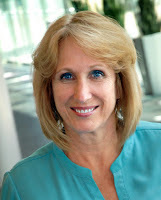 Tropical island votary and history buff, PeggySue Wells parasails, skydives, snorkels, scuba dives, and has taken (but not passed) pilot training. Writing from the 100-Acre wood in Indiana, Wells is the bestselling author of twenty-eight books including The Slave Across the Street, Slavery in the Land of the Free, Bonding With Your Child Through Boundaries, Homeless for the Holidays, and Chasing Sunrise. Optimistic dream-driver, PeggySue is named for the Buddy Holly song with the great drumbeat. At school author visits, she teaches students the secrets to writing, and speaks at events and conferences. Connect with her at www.PeggySueWells.com, on Facebook at PeggySue Wells, and Twitter @PeggySueWells.
Tropical island votary and history buff, PeggySue Wells parasails, skydives, snorkels, scuba dives, and has taken (but not passed) pilot training. Writing from the 100-Acre wood in Indiana, Wells is the bestselling author of twenty-eight books including The Slave Across the Street, Slavery in the Land of the Free, Bonding With Your Child Through Boundaries, Homeless for the Holidays, and Chasing Sunrise. Optimistic dream-driver, PeggySue is named for the Buddy Holly song with the great drumbeat. At school author visits, she teaches students the secrets to writing, and speaks at events and conferences. Connect with her at www.PeggySueWells.com, on Facebook at PeggySue Wells, and Twitter @PeggySueWells.
Published on August 02, 2021 22:00
August 1, 2021
15 Tips to Help You Find Time to Write

by Edie Melson @EdieMelsonI think one of the biggest obstacles writers face is finding the time to write. It's a common myth to think that time just magically appears.
Truthfully, we never FIND time to write, we have to carve out time to write.
That’s what separates the wanna-be from the professional.
Here are my tips to make sure I make writing a priority.
1. Make an appointment. I’ve learned that if I don’t have it on my calendar, it doesn’t happen. For me, that’s true. My days fill up fast, but if I have a time scheduled to write, then it happens.
2. Quit with the guilt. For some reason we make everyone else’s dreams and goals a priority. Why do we neglect our own? Is God’s call less important because it’s me?
3. Get ready to make choices. Truthfully you can’t do it all. No one can. How important is writing to you? If you’re like me, you can’t live without writing. A day without writing feels like a failure. It’s the way I process life. But I still have to make choices.
4. Watch the clock (especially online). It’s not enough to sit down at the computer. We also have to turn off the Internet and actually write. Surfing social media doesn’t count. Reading blogs about writing doesn’t count. These are important parts of being an author, but they’re NOT writing!
5. Don’t go it alone. Yes, the act of writing is a solitary process. But you still need a tribe. We need encouragement, accountability, and honesty. As writers we’re not good at objective evaluation. We tend to swing between extremes. Either our writing feels like it’s brilliant, or it’s junk. We need the perspective other writers can bring to the table. And yes, they need to be writers. Non-writers don’t understand the process.
6. Evaluate your writing buddies. Yes, we all need writing buddies. But they need to be working writers. Not people who like to sit around and talk about writing. Make sure they’re people who understand the discipline and drive it takes to succeed. You need people who will hold you accountable, not people who’ll help you come with excuses not to write.
7. Be courageous. Failure isn’t the worst thing that can happen to a writer. Often failure teaches us more than success. The worst thing that can happen to a writer is to not write.
8. Learn to write when you don’t feel like it. This is one of the biggest differences between the professional and the amateur. The pros know you have to write whether you’re in the mood or not.
9. Be willing to write junk. So often you have to write junk to get to the jewels. The only thing you can’t fix is a blank page.
10. Schedule a write-in. Make a date, meet some friends at a local coffee shop and write. Having a group will spur you to higher word counts and amp up the accountability factor.
11. Build in rewards. When I set a goal, I like an incentive. So I build in small rewards for making word count.
12. Take a break. When I get stuck, it helps to do something. I take a short walk, do a quick chore like load the dishwasher. The physical action stimulates my mind. It's also healthy for your back.
13. Write in the spaces. Some days we only have short bits of time in which to write. It’s a myth that we have to have large chunks of time to get something done. An hour is still an hour, even if it’s broken into fifteen minute chunks.
14. Write regularly. When I started out, my kids were young. I couldn’t write during the daytime. So my husband and I worked out a schedule. I’d be with the family during the day and evening. When everyone went to sleep, I’d get back up and write until three or four o’clock in the morning. Then my husband would get the kids up and off to school in the morning while I slept in. It wasn’t a normal schedule, but it was a schedule.
15. Pray first. This one is the very most important tip. Pray when you're organizing your schedule, pray when the thought of writing pops into your head and pray when you sit down to write.
These are my tips to carve out time to write. What would you add to the list? Be sure to leave your thoughts in the comments section below.
Don’t forget to join the conversation!Blessings,Edie
TWEETABLE15 Tips to Help You Find Time to Write - @EdieMelson (Click to Tweet)
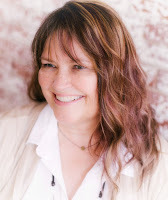 Edie Melson is a woman of faith with ink-stained fingers observing life through the lens of her camera. No matter whether she’s talking to writers, entrepreneurs, or readers, her first advice is always “Find your voice, live your story.” As an author, blogger, and speaker she’s encouraged and challenged audiences across the country and around the world. Her numerous books reflect her passion to help others develop the strength of their God-given gifts and apply them to their lives. Connect with her on her WEBSITE, through FACEBOOK, TWITTER and on INSTAGRAM.
Edie Melson is a woman of faith with ink-stained fingers observing life through the lens of her camera. No matter whether she’s talking to writers, entrepreneurs, or readers, her first advice is always “Find your voice, live your story.” As an author, blogger, and speaker she’s encouraged and challenged audiences across the country and around the world. Her numerous books reflect her passion to help others develop the strength of their God-given gifts and apply them to their lives. Connect with her on her WEBSITE, through FACEBOOK, TWITTER and on INSTAGRAM.
Published on August 01, 2021 22:00
July 31, 2021
Writing Lessons from a Camera

by Edie Melson @EdieMelson
The heart of man plans his way, but the LORD establishes his steps. (Proverbs 16:9)
When hubby and I go hiking in the Blue Ridge Mountains and I always bring my camera. And I usually take a LOT of pictures. But I never know exactly what I'm going to end up with when I get home and see the pictures on my computer screen. They rarely turn out as I expect. Sometimes they're better and sometimes they're a disappointment.
When I’m in the process of taking pictures, it’s like being in the thick of battle. I clamber over obstacles, scope out the view and plan the shots. Sometimes, like with this picture, I stand in icy cold water, hoping what I achieve will be worthwhile.
But I never know for sure until I’m back home and take a look.
AND I put the images out for others to see.
Because it's not just how I feel about an image that makes it valuable, it's how it makes others feel when they look at it.
Truthfully, that's exactly what following God’s call to write is like.
Each manuscript—large or small—is in a way, a battle. I sit at my computer scope out the viewpoints, clamber over obstacles—like doubt, fear, and time—and plan what I’ll write. I sit and write, hoping that what I create is worthwhile, but never knowing until I’m finished.
And I put my writing out there for others to read.
So next time you're in the thick of battle, don't give up and don't despair. Give your writing a chance by finishing it and sharing it with others!
TWEETABLEWriting Lessons from a Camera - @EdieMelson (Click to Tweet)
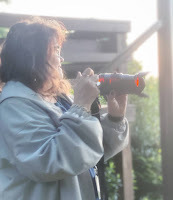 Edie Melson is a woman of faith with ink-stained fingers observing life through the lens of her camera. No matter whether she’s talking to writers, entrepreneurs, or readers, her first advice is always “Find your voice, live your story.” As an author, blogger, and speaker she’s encouraged and challenged audiences across the country and around the world. Her numerous books reflect her passion to help others develop the strength of their God-given gifts and apply them to their lives. Connect with her on her WEBSITE, through FACEBOOK, TWITTER and on INSTAGRAM.
Edie Melson is a woman of faith with ink-stained fingers observing life through the lens of her camera. No matter whether she’s talking to writers, entrepreneurs, or readers, her first advice is always “Find your voice, live your story.” As an author, blogger, and speaker she’s encouraged and challenged audiences across the country and around the world. Her numerous books reflect her passion to help others develop the strength of their God-given gifts and apply them to their lives. Connect with her on her WEBSITE, through FACEBOOK, TWITTER and on INSTAGRAM.
Published on July 31, 2021 22:00
July 30, 2021
Mini Memoir Moment: The Power of Place in Your Writing

by Marcia Moston @MarciaMoston
How the Home of Your Past Influences Your Present Preferences
Think about a place of your childhood. What first comes to mind? Whether it’s the family kitchen, the grandparents’ woodshed, the baseball field, or the big tree in the backyard, our earliest memories are attached to a place. Places stick in our minds because they embody something more than the physical space they occupy. The places of our lives, especially those of our childhood, are saturated with emotional and psychological associations.
According to builder and home designer Chris Travis, the emotional and psychological attachments we associate with those places, even though we aren’t consciously aware of them, affect our responses to our present-day surroundings. Understanding the root of these attachments helps him design homes that take these buried associations into account.
For example one couple was deadlocked about having a basement; the husband wanted it, the wife was inexplicably against it. Through one of Travis’s Truehome exercises, they discovered the wife was claustrophobic and had negative childhood associations with closed spaces like deep closets and basements. This discovery helped the designer come up with something that satisfied the husband’s need for space and his wife’s aversion.
Memoirists know that examining the past helps to understand the present and possibly affect the future. So of course, being the inward-looking person I am, I started thinking about the homes of my past and how they may have influenced the many other homes of my life.
My husband and I have moved about eight times over the years of our marriage. Although we haven’t always had a choice about our dwellings—the two-room adobe house with outside sink and scorpions climbing down the walls in Guatemala, the four-room downstairs parsonage apartment with the slanting floor and upstairs tenant in Vermont—I realized every house, from the first cape on Long Island with the ugly green asphalt siding to our present white, light, bright one—had great yards.
The yard is the first thing I look at when considering a house. When I thought about the places of my childhood, I realized my memories were mostly about being outdoors. Despite my mother’s efforts, the house I grew up in usually looked like someone had opened the door and let a hurricane pass through. But we didn’t care because we were allowed to roam the meadows, rivers and lakes from dawn to dusk. (What was my mother thinking!) And that penchant for living outside while snug inside is always with me—as is the need for order.
I’ve used the following example a gazillion times—and yes, I remember that I have in case you think I'm getting forgetful—but it is so good it deserves to be repeated. C.S. Lewis writes about the place of influence in his childhood. His father moved the family to a large house. Lewis’s brother went away to school, leaving Lewis alone much of the time. In Surprised by Joy, Lewis describes the impact this house had on him:
The New House is almost a major character in my story. I am a product of long corridors, empty sunlit rooms, upstairs indoor silences, attics explored in solitude distant noises of gurgling cisterns and pipes, and the noise of wind under the tiles. Also, of endless books.What about the places of your past?
Here are a few prompts to help you explore this idea. You might be surprised what you come up with.
1. Model Lewis’s format and write about a place that had an impact on you as a child. I am a product of . . .
2. Start a sentence with It was a place where . . .
3. What was home like for you? How has it influenced your idea of home now? What emotional or psychological impact does it have on your present preferences?
Blessings,MarciaTWEETABLEMini Memoir Moment: The Power of Place in Your Writing - @MarciaMoston on @EdieMelson (Click to Tweet)
 Marcia Moston loves to write, teach, and talk about the possibilities of an ordinary life in the hands of an extraordinary God. She has contributed to several magazines, anthologies, and newspapers, and teaches narrative nonfiction with the OLLI at Furman program. She’s the author of Call of a Coward—the God of Moses and the Middle-Class Housewife and Going South –with the God of Jacob’s and My Mistakes.
Marcia Moston loves to write, teach, and talk about the possibilities of an ordinary life in the hands of an extraordinary God. She has contributed to several magazines, anthologies, and newspapers, and teaches narrative nonfiction with the OLLI at Furman program. She’s the author of Call of a Coward—the God of Moses and the Middle-Class Housewife and Going South –with the God of Jacob’s and My Mistakes.
Published on July 30, 2021 22:00
July 29, 2021
Curiosity and Passion: The Writer’s Friends

by Craig von Buseck @CraigVonBuseck
As a writer of history and biography, I have found two essential keys to writing success—curiosity and passion. These two tools come into play from the choosing of a project until the submission to an editor or publisher.
Seeds of a Story
For me, the genesis of a project begins with curiosity about a story of interest. So much work goes into a writing project, whether it is an article, a nonfiction book, narrative nonfiction, historical fiction, or a biography. The writer must first find the story intriguing in itself or she may not want to commit the time and energy to finishing the project. If the write doesn’t have a passion about the story, it is likely the general public won’t either.
This is where both curiosity and passion become indicators in the writer’s decision making regarding which projects to pursue.
Curiosity Leads Research
Once I become interested in a subject, I find that it is curiosity that pushes me to learn more about it. Every subject I have ever chose has questions attached to it that need to be answered. I find that I press on in my research until I discover the truth.
This is where curiosity and passion tend to act as a team. By seeking to answer the curiosity questions, I become more interested in the subject. This brings me to an inevitable crossroad. I may satisfy my curiosity by discovering that a story is nice, but not truly compelling. In this case my search comes to an end and I move on to another project. Then again, I may take the other path at this crossroad by learning that this is, as one literary agent once told me, “a story that needs to be told.” At this point, curiosity passes the baton on to passion and we are off to the races!
In my book Victor! The Final Battle of Ulysses S. Grant, curiosity drove me to find out if General Grant was able to overcome bankruptcy and throat cancer to finish his Personal Memoirs and secure his wife’s financial future before he died.
In my book I Am Cyrus: Harry S. Truman and the Rebirth of Israel, curiosity drove me to discover how President Truman’s Jewish business partner and lifelong friend, Eddie Jacobson was able to convince the president to meet with the Zionist diplomat, Chaim Weizmann, who eventually convinced him to recognize and support modern Israel.
In my book Forward! The Leadership Principles of Ulysses S. Grant, curiosity led me in my quest to discover how General, and later President Grant overcame alcoholism.
Both curiosity and passion take turns sharing the lead in the research and outlining process. We call this “pre-writing,” and it is a vital part of the writing process. For a writer of history and biography, this process that take years—sometimes even decades. The waning of curiosity through the answering of the big questions is a signal that the research is coming to a close and it’s time to move from pre-writing into the actual writing process.
Passion in Writing Scenes
The process I use in writing my books is, as I have said, to do the research and outlining in the pre-writing stage. This includes the choosing of individual scenes within each chapter. Once the writing process begins, I allow myself to be led by passion. Instead of writing the story chronologically, I post the list of scenes within each chapter in a prominent place—either next to my desk, posted on the refrigerator, and usually in both places. The point is to have these scenes posted in a place where I see them often and, as a result, think of them often.
When I’m in the heat of a project, I try to write most mornings on the weekdays, then as often as I can on a Saturday. After a time of prayer, asking the Holy Spirit to guide me, I then choose the scene that I will work on that day. This is done more from the heart – what I am passionate about—than by the head. I read over the list of scenes and see which one causes my heart to leap a bit. That is the scene I work on that day.
Passion in Finishing the Project
As is true in all things, passion often wanes as a project continues on. The scenes that are left at the end are usually not as exciting—which is why they are left for the end. Now passion changes from the excitement of the scene to the anticipation of completing the book. Once all the scenes are completed I go to work on writing the introductions, exposition, transitions, connecting material, and conclusions to make it a readable book.
In the end, the passion to make the story known carries me through the more tedious work of editing and correcting the manuscript. As I tell my writing students, “the key to effective writing is pre-writing, writing, re-writing, and re-writing again.
That passion is also a driving force for marketing the book that I have written, with the goal of making the story known to those who need to know.
Beginning the Next Project
Once the book is on the market and I have done what I can do to make it known to the public, I go back to my old friends, curiosity and passion to find out what great story I will be telling next! I don’t know about you, but for me the life of a writer is a wonderful adventure!
TWEETABLECuriosity and Passion: The Writer’s Friends - @CraigVonBuseck on @EdieMelson (Click to Tweet)
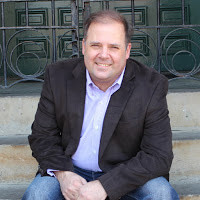 Dr. Craig von Buseck is an award-winning author and the Managing Editor for Inspiration.org. His new books are Victor! The Final Battle of Ulysses S. Grant, a biography of the final two years in Grant’s life, and the companion, Forward! The Leadership Principle of Ulysses S. Grant. Learn more at vonbuseck.com.
Dr. Craig von Buseck is an award-winning author and the Managing Editor for Inspiration.org. His new books are Victor! The Final Battle of Ulysses S. Grant, a biography of the final two years in Grant’s life, and the companion, Forward! The Leadership Principle of Ulysses S. Grant. Learn more at vonbuseck.com.
Published on July 29, 2021 22:00
July 28, 2021
Creating Authenticity Within Fiction

by Kathleen Neely @NeelyKneely3628
Authenticity within fiction may sound like a paradox, but let me explain. Today’s readers are very selective. Inaccuracies lead to poor reviews, something most writers dread. Research is not just for time period novels.
Let’s look at elements of a novel that require accuracy.
Setting: Choose a place that you know well or visit it during a fact-finding excursion. Make the setting influence the story. I chose Pittsburgh for The Least of These because of the abundance of bridges and homeless communities. Asheville became the setting for The Street Singer due to the artsy nature of the town. Once you choose a setting, learn the culture, the street names, the directional location of venues, and the rich smells and sounds.
Occupations: This is so important because it typically does double duty in your novel. Often a character’s occupation is integral to the plot. Their backstory, talents, and apptitudes are intrinsically linked to what they do for a living, so the author better know it well. Don’t be afraid to ask. I’ve found that people love talking about their occupation.
Hobbies: I like using what I call sub-themes. For instance, in The Street Singer, you’ll find Trisha remodeling her grandfather’s old farmhouse. Beauty for Ashes features Nathan, a basketball enthusiast and Angie, an amateur violinist. In Search of True North’s name was derived from Mallory’s love for astronomy. These sub-themes kept me researching how to create a homemade telescope; listening to classical violin selections; learning the terminology and care of a violin, and much more. I am fortunate to have a friend who plays first chair violin for a major symphony. He read the draft of my violin passages and said, “We have to talk!”
Legal and Medical: I love legal novels and movies. You’ll find a common thread in a few of my novels with legal issues. I’m out of my element so I must rely on research to write those scenes well. I’ve used a variety of sources but the best is advice from attorneys. If your plot delves into legal issues or medical concerns, you’ll find a plethora of information online. My strategy is to use the online info, then send those portions of the manuscript to a professional who has agreed to verify. The online info has been surprisingly accurate, but I’ve been alerted to a number of passages in need of rewording.
A few tips: Research should enhance your story, not overpower it. Don’t bog your story down with unnecessary details just because you can. If you’ve extensively researched details of a character’s disease or occupation, only use what drives the story. Don’t turn your novel into a non-fiction documentary. Not every fact needs to be mentioned. Whenever possible, use context clues to explain unfamiliar vernacular rather than supplying an overt definition. Allow the scene to explain those uncommon words. Keep track of your sources. When seeking publication, you may be called to validate your information. If you have research tips to share, I’d love to hear from you.
TWEETABLECreating Authenticity within Fiction - @NeelyKneely3628 on @EdieMelson (Click to Tweet)
Kathleen Neely is a retired elementary principal, and enjoys time with family, visiting her two grandsons, traveling, and reading.
She is the author of The Street Singer, Beauty for Ashes, The Least of These, and In Search of True North. Kathleen won second place in a short story contest through ACFW-VA for her short story “The Missing Piece” and an honorable mention for her story “The Dance”. Both were published in a Christmas anthology. Her novel, The Least of These, was awarded first place in the 2015 Fresh Voices contest through Almost an Author. She has numerous devotions published through Christian Devotions.
Kathleen continues to speak to students about writing and publication processes. She is a member of American Christian Fiction Writers.
Website – www.KathleenNeely.com
Facebook – www.facebook.com/kathy.neely.98
Twitter - https://twitter.com/NeelyKneely3628
Instagram – www.Instagram.com/KathleenNeelyAuthor
Published on July 28, 2021 22:00
July 27, 2021
Who are You When You are Writing?

by DiAnn Mills @DiAnnMills
When writing presses against your mind, and you can’t wait to begin, who are you?
Are you the subject of a memoir, a person whose life experiences could help others through chaos and tragedies?
Are you a poet who deeply feels the meaning and rhythm of words?
Are you a novelist who strives to create a story where others can engage in the protagonist’s journey?
Are you an expert whose writing focuses on facts, true events, and people?
Are you a child who lives in a make-believe world filled with adventure and discoveries?
Or are you an imaginative soul who craves the beauty of words, one who looks at the world as an intricate puzzle?
Who is a Writer?
No matter how words are strung together, they show a creative spirit who spins letters into words, words into phrases, and phrases into a piece of art.
A writer becomes the center of whatever they are penning. They weave their spirit into their prose and the result is a unique expression of their personality and gift.
Originality and voice develop as we write. Originality in writing is the ability to create a piece that blends freedom of thought by transferring it into words and phrases. Voice uses the writer’s personality, the way they think and process, and transfers the blend into words and phrases.
Imitation is valuable when a writer explores why another writer’s piece works. A new technique can be studied to understand the mechanics. But when the writer applies a technique to their own writing, it must contain the originality and voice of the writer’s personality and skill. Together these traits demonstrate a writer who is working diligently at the craft to develop continued professionalism.
Who are you when you write? You’re an independent individual who treasures the magic of words. Those words form passages that add meaning and beauty to the one creating them and to the reader.You’re a person who values each step toward a perfected piece.You’re a person who believes they’ve been given a gift to share with the world.You’re a person who longs for time alone to create.You’re a masterful thinker who respects the process of communicating through the written word.Share with us who you are!
TWEETABLEWho are You When You are Writing? @DiAnnMills on @EdieMelson (Click to Tweet)
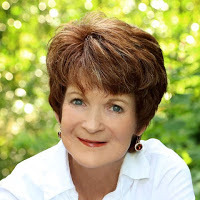 DiAnn Mills is a bestselling author who believes her readers should expect an adventure. She creates action-packed, suspense-filled novels to thrill readers. Her titles have appeared on the CBA and ECPA bestseller lists; won two Christy Awards; and been finalists for the RITA, Daphne Du Maurier, Inspirational Readers’ Choice, and Carol award contests.
DiAnn Mills is a bestselling author who believes her readers should expect an adventure. She creates action-packed, suspense-filled novels to thrill readers. Her titles have appeared on the CBA and ECPA bestseller lists; won two Christy Awards; and been finalists for the RITA, Daphne Du Maurier, Inspirational Readers’ Choice, and Carol award contests. She is the director of the Blue Ridge Mountain Christian Writers Conference, Mountainside Marketing Retreat, and Mountainside Novelist Retreat with social media specialist Edie Melson. Connect here: DiAnnMills.com
Published on July 27, 2021 22:00
July 26, 2021
Dipping the Quill Deeper: “Be a Fish”

by Eva Marie Everson
I took French in “middle school,” as we called it. “Junior high,” it is now called. My teacher was a wonderfully funny and creative man named Jack Griffin. If I’m not mistaken, he is the first teacher my classmates and I ever called by a first name. Never in class, of course. In class he was “Mr. Griffin,” but outside of class we called him “Jack.” Even in his presence.
Jack made learning French fun. When we got our lessons right—or when we got them wrong—he’d put on his best Jack Benny face and, slapping his hand against his cheek, exclaim, “Mon Dieu!” And, we were left to determine whether he had praised or condemned our efforts.
I did well in French. Mr. Griffin—Jack—said I had the accent for it. And, after all that year’s book-learning, I managed to hold on to enough French to converse in the basics. I can say things like hello, goodbye, thank you very much, and how are you . . . with enough je ne sais quoi that, while dining at some little French bistro at Epcot a few years back, I replied with a “merci beaucoup,” to a waiter who began conversing with me at rapid speed. I understood not a word.
Five years ago, my husband and I moved to a new house in a new neighborhood. You’d think we now lived in the middle of the United Nations. Russians, Japanese, Hispanics, French, Kuwaitis, Filipino, and both Southern and Northern Americans make up the population of this cul-de-sac. After getting to know the neighbors, I decided to revisit my French lessons so as to have some fun conversations with the family from France who lived two doors down.
All this came about at the same time as I was attempting to complete another theological degree. And write a book. Or two. And run Word Weavers. And direct Florida Christian Writers Conference and (in those days) the North Georgia Christian Writers Conference. And work as a freelance editor. And be a wife. A mother. A grandmother. A homemaker. A doctor-a lawyer-an Indian chief. My life spun out of control and came to a crashing halt when I received the call in May 2019 that my brother was dying. I dropped everything to care for him.
I stopped with the French lessons. I dropped out of school. I put one book aside for a later date and, after my brother’s death, picked up the other one, finishing it (Dust) a year later. Thanks to the pandemic shortly thereafter, we folded the North Georgia conference. I streamlined Word Weavers even more than it had been previously. I became pickier about the projects I took on as a freelance editor. Slowly . . . slowly . . . my life returned to what God called me to versus all the things I wanted to do.
In his book, Prayer, Simon Tugwell wrote: St. Ambrose gave his congregation some very good advice. Using the old Christian symbol, he compared them in this stormy world to fish swimming in the sea. And to them too he said: “Be a fish.” We must learn how not to be swamped by the situations that we find ourselves in. We must learn how to get through them with a minimum of damage, and a maximum of profit.
I find myself looking at life a little differently these days. I have given notice to this Type-A personality of mine. I cannot do what God has called me to do—walking closer with Him, leading Word Weavers (which includes the Florida conference), writing for Him, and (above all) being a part of my family—if I’m trying to accomplish too many “other things.”
Nor can you. I don’t know why it surprises me, the things we try to squeeze into a day. And then we wonder why we come out on the other side having done things halfway. Or, not at all. Feeling tired. We’re left wondering where we fit in it all. We’re depressed. Angry. Frustrated. We begrudge the call.
Well, no wonder. We allow ourselves to get swamped by life so much so that when “situations” come along, we come undone.
So, I encourage you now. Today. Look at your life. What can go? What should stay? What has He called you to? What did you call yourself to?
Be a fish. Comprendre?
TWEETABLEDipping the Quill Deeper: “Be a Fish” - Eva Marie Everson on @EdieMelson (Click to Tweet)
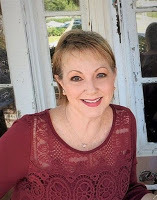 Eva Marie Everson is the president of Word Weavers International and the director of its two conferences. She is the multiple award-winning author of nearly 40 works and has received awards as a speaker and Bible teacher. Eva Marie is often seen at writers conferences across the States. She served as a mentor for Jerry B. Jenkins’ Christian Writers Guild for several years, and taught as a guest professor at Taylor University in 2011. She and her husband make their home in Central Florida where they enjoy their grandchildren. They are owned by one small dog and a princess cat.
Eva Marie Everson is the president of Word Weavers International and the director of its two conferences. She is the multiple award-winning author of nearly 40 works and has received awards as a speaker and Bible teacher. Eva Marie is often seen at writers conferences across the States. She served as a mentor for Jerry B. Jenkins’ Christian Writers Guild for several years, and taught as a guest professor at Taylor University in 2011. She and her husband make their home in Central Florida where they enjoy their grandchildren. They are owned by one small dog and a princess cat.
Published on July 26, 2021 22:00



